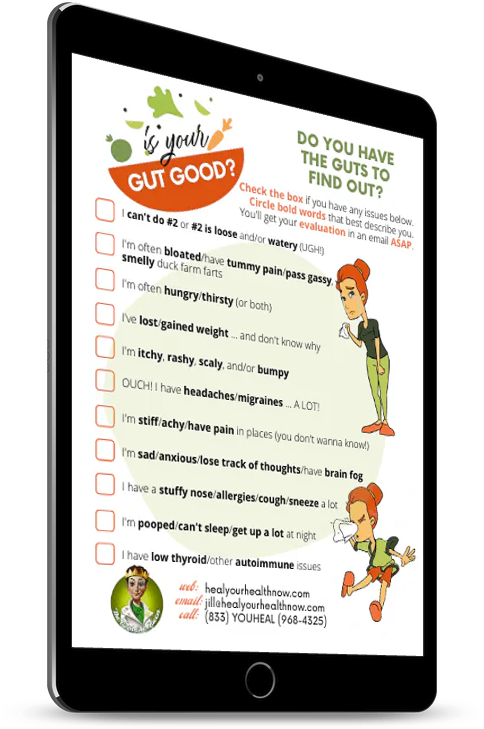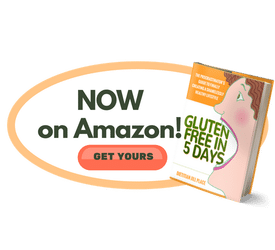By Dietitian Jill Place
We now know that every chronic disease is an inflammatory disease. No matter what so-called disease you have, from cancer to the common cold, inflammation is a major part of your problem.
For years, we used to think that disease was caused by germs. But now we know that that’s only 30% true … although doctors would still have you believe that it is so …
I have a TIME magazine cover over the desk in my office. It reveals “The surprising link between INFLAMMATION and HEART ATTACKS, CANCER, ALZHEIMER’S and other diseases”. And labels inflammation “The Secret Killer”.
I have it over my desk because it’s dated February 23, 2004 … ALMOST 20 YEARS AGO! Every time I look at it, all I can think of is, “why don’t doctors get this!” It’s about F-King TIME!
What Inflammation Does to Us
Inflammation is part of the body’s natural healing system. You cut your finger … it swells. That’s the immune system rushing to to your aid … creating inflammation to heal that cut as fast as it can.
But an inflammatory response can also happen when the immune system goes into action without an injury or infection to fight. Like when leaky gut occurs … and stuff leaks into the immune system, most of which is just below the gut.
The immune system springs into action, attacking that foreign stuff. Inflammation results. And at some point, immune system cells that normally protect us then might begin to destroy healthy arteries, organs and joints.That’s called an autoimmune reaction.
Also, when you don’t eat healthfully or move your body enough or have chronic stress … which describes just about every American these days … your body reacts by triggering inflammation. In other words, you can’t see it or feel it, but inflammation may slowly be damaging your body.
Early signs may be subtle … an ache here, a little fatigue there. Most of us consider this slight unwellness as our normal state.
But left unchecked, inflammation can contribute to chronic diseases, such as heart disease, blood vessel disease, diabetes, obesity, cancer, Alzheimer’s disease, autoimmune and other conditions.
Immune system cells that cause inflammation contribute to the buildup of fatty deposits in the lining of your arteries. These can rupture, causing clots that may block your blood vessels. Depending upon where the blockage is, heart attacks and strokes can result.
Measuring Inflammation
The most common way to measure inflammation is with a C-reactive protein (hs-CRP), an inflammatory marker. Doctors also measure homocysteine levels to evaluate chronic inflammation.
Finally, it’s wise to also test a measurement of blood sugar … HbA1C … to assess damage to red blood cells. There are also quite a few functional tests that can test directly for inflammation.
But the best way I know to decrease inflammation and begin healing the gut (FYI … they go together like coffee and coconut creamer) is to test for and subsequently avoid sensitive foods.
Can Anti-Inflammatory Foods Prevent Disease?
What causes inflammation? Most importantly, the standard American diet (SAD diet). Our American diet is pro-inflammatory. It is rich in pro-inflammatory compounds, while lacking antioxidants and other nutrients that help to prevent and control inflammation.
These days, Americans obsessively consume refined carbohydrates and white sugar and flour which cause acidic, inflammatory systems. Reducing inflammation can put your body in a more alkaline state to stay optimally disease-free.
One that’s free of heart disease, cancer, diabetes, arthritis, and other degenerative and immune disorders. Conversely, an acidic diet, inflammation, and disease are also closely linked.
One of the ways to decrease inflammation and thereby prevent disease is to identify and avoid sensitive foods. I’ve had oodles of success stories with my FOODStrong™ for food sensitivities plan. Many of them are on my home page and the FOODStong™ page.
So … yes … I do believe that eating certain foods in a pure, unprocessed state can reduce inflammation. And, as a matter of fact, we alternative/functional practitioners have been talking about the same foods and calling them “healthy”, “natural”, and “optimal” for what seems like forever.
So what should you eat? If you suspect inflammation, the best way is to reduce it is to do the FOODStrong™ for food sensitivities plan to find out your food sensitivities once and for all.
But, if that’s not an option for you, here’s some great information about Pro- and Anti-Inflammatory foods. Courtesy of my Certified LEAP Therapist colleague, Megan Shamleffer, MS, RD, LD, CLT. FYI … you probably won’t be surprised that the anti-inflammatory ones are those that we nutrition professionals are always encouraging you to eat.
ANTI-INFLAMMATORY FOODS
Monounsaturated fats:
Heart-healthy fats raise your good cholesterol and contain high amounts of antioxidants, which help to remove damage from the body. Aim for two to three sources per day.
Sources: Extra virgin olive oil, olives, avocados, nuts/seeds and their cold-pressed oils, and natural nut butters.
Omega-3 Fats:
These are essential fatty acids, meaning they must be obtained by food! They inhibit enzymes that trigger inflammatory hormones and suppress cytokines which erode cartilage. Aim for one source every day; eat fatty fish 2-3 times per week.
Sources: Fatty fish (salmon, sardines, tuna, halibut and mackerel), walnuts, flax/chia seeds and pastured (grass-fed) eggs, beef, milk and chicken.
Fruits and Vegetables:
All fruits and vegetables provide a wide array of vitamins, minerals and antioxidants that help eliminate damage and heal the body. However, there are certain fruits and vegetables that provide extra benefits.
Sources:
Leafy greens: Low in calories and high in antioxidants. Aim for one cup per day.
Berries: Low in sugar and high in antioxidants. Aim for four servings per week.
Broccoli, cabbage and cauliflower: Contain natural detoxifying components and a potent antioxidant.
Orange fruits and veggies: High in vitamin A, a powerful antioxidant.
Herbs and Spices:
These contain concentrated amounts of antioxidants and can upgrade your food without adding calories or extra sodium.
Sources:
Turmeric: Contains compounds that influence more than 700 genes in the body. Pair with black pepper.
Green tea: High in antioxidants, add a squeeze of lemon to enhance antioxidant absorption.
Cinnamon: Helps stabilize blood sugar levels. High blood sugar has pro-inflammatory effects.
Ginger: Helps to suppress pro-inflammatory compounds
Be sure to check out my Immune-Support Smoothie in the “Recipes” section of this website. It has many of the foods listed above … all in one easy-to-consume package … tied with a bow!
PRO-INFLAMMATORY FOODS
Trans Fat:
Triggers systemic (whole body) inflammation by damaging the arteries. Trans fat turns into a cardboard-like molecule that tears apart the blood vessels, triggering inflammation. Look for the word fully or partially hydrogenated oils on the ingredient list.
Refined Carbohydrates:
Fuel the production of components that stimulate inflammation. Similar to processed sugar, these foods cause rapid spikes in blood sugar. And contain almost no fiber; fiber-rich foods have been associated with decreased inflammation. Limit white flour products (bread, crackers and rolls), white rice, cakes, pretzels, cookies and instant mashed potatoes.
Omega-6 Fats:
Essential fatty acids, just like omega-3’s (above). The body needs a balance of omega-3 and omega-6 fats. Excess omega-6 triggers the body to produce pro-inflammatory chemicals. Limit corn, safflower, sunflower, peanut, grape seed and veggie oils, commercial salad dressing and mayonnaise.
Oh and by the way … if you’re wondering about the title of this article … black licorice may be a candy but it is also a powerful anti-inflammatory agent. I use the supplement DGL (deglycyrrhizinated licorice) on a regular basis.
Both the supplement and candy or tea made with actual licorice root (not the multi-colored sweet pictured above) are used for various digestive system complaints including stomach ulcers, heartburn, colic, and ongoing inflammation of the lining of the stomach (chronic gastritis). Just thought you’d like to know …
So learning how to prevent and reverse inflammation will go a long way toward preventing and reversing almost all disease. As well as slowing the aging process and keeping us healthy, biologically young and vigorous for a lifetime.


Leave a Reply